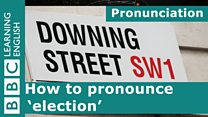Unit 10: Towards Advanced
Grammar, news, vocabulary and pronunciation
Select a unit
- 1 Towards advanced
- 2 Towards advanced
- 3 Towards advanced
- 4 Towards advanced
- 5 Towards advanced
- 6 Towards advanced
- 7 Towards advanced
- 8 Towards advanced
- 9 Towards Advanced
- 10 Towards Advanced
- 11 Towards Advanced
- 12 Towards Advanced
- 13 Towards Advanced
- 14 Towards Advanced
- 15 Towards Advanced
- 16 Towards Advanced
- 17 Towards Advanced
- 18 Towards Advanced
- 19 Towards Advanced
- 20 Towards Advanced
- 21 Towards Advanced
- 22 Towards Advanced
- 23 Towards Advanced
- 24 Towards Advanced
- 25 Towards Advanced
- 26 Towards Advanced
- 27 Towards Advanced
- 28 Towards Advanced
- 29 Towards Advanced
- 30 Towards Advanced
Session 5
Tim's Pronunciation Workshop: pronouncing 'nd'
What happens when a word or syllable ending in the sound /nd/ is followed by a word or syllable starting with a consonant sound? Tim explains...
Activity 1
Tim's Pronunciation Workshop: Assimilation of /nd/
An egg sandwich...
Tim's still on his mission to help you sound more natural when you speak English - this time with the help of an egg sandwich and the good people of London.
To do
Take a look at the video, then try the activity to do some practice.
Watch the video and complete the activity

Tim
Hi, I'm Tim and this is my pronunciation workshop. Here, I'm gonna show you how English is really spoken. It'll help you become a better listener and a more fluent speaker. Come on, let's go inside. Now, when we speak English fluently, the sounds in words can join together, change or even disappear entirely. Sometimes more than one of these can happen. Take this for example. Now, I'm sure you know what it is, but let's ask the people of London:
Voxpops
An egg sandwich
It's a sandwich
It's a sandwich
It's an egg sandwich
Tim
Now, the word 'sandwich' has an /n/ followed by a /d/, doesn't it? Or does it? Listen again, what sound can you hear?
Voxpops
An egg sandwich
It's a sandwich
It's a sandwich
It's an egg sandwich
Tim
Instead of 'sandwich', we hear 'samwich'. That's pretty crazy, right! So, what is going on? Well, first the /d/ disappears in between two consonants. You might remember this from our video on elision. So 'sandwich' becomes 'sanwich'. Now, we have an /n/ followed by a /w/ and /n/ changes to /m/ before /w/. You might remember this from our video on assimilation. So sandwich becomes samwich. Have another look – this time in slow motion. Watch the shape of the mouth. Can you see /nd/, or /m/?
Voxpops
Sandwich
Sandwich
Sandwich
Sandwich
Tim
Pretty cool, huh? Here are some more examples:
Examples
My grandparents have been married for 50 years.
I got a standby ticket.
The band played until midnight.
I left my handbag on the train.
Tim
Ok, so you've heard the examples, and now it's your turn. Are you ready? Listen and repeat.
Examples
My grandparents have been married for 50 years.
I got a standby ticket.
The band played until midnight.
I left my handbag on the train.
Tim
Well done. Remember if you want to see more on pronunciation please visit our website: bbclearningenglish.com. That's about it from the pronunciation workshop for now. I'll see you soon. Bye. Now, where did I put that sandwich? It was handmade, just for me. Argh!
Assimilation when words end in /nd/
When a word or syllable ending in the /nd/ sound is followed by a word or syllable beginning in a consonant sound such as /p/, /b/, /m/ or /w/, sometimes, the /nd/ and the consonant sound come together and change to /m/. Some examples of phrases where this might happen include:
- My grandmother is 90
- I got a standby ticket
- The band played until midnight
To do
Got that? Now try this activity to get some more practice.
The /nd/ game
6 Questions
How many examples of assimilation of /nd/ followed by /b/, /p/, /w/ or /m/ are there in each sentence? You decide...
Help
Activity
How many examples of assimilation of /nd/ followed by /b/, /p/, /w/ or /m/ are there in each sentence? You decide...
Hint
When a word ends in an /nd/ sound and the next word begins with a /b/, /p/, /w/ or /m/, the /nd/ at the end will change to an /m/ as your mouth gets ready to say the next sound.Question 1 of 6

Help
Activity
How many examples of assimilation of /nd/ followed by /b/, /p/, /w/ or /m/ are there in each sentence? You decide...
Hint
When a word ends in an /nd/ sound and the next word begins with a /b/, /p/, /w/ or /m/, the /nd/ at the end will change to an /m/ as your mouth gets ready to say the next sound.Question 2 of 6

Help
Activity
How many examples of assimilation of /nd/ followed by /b/, /p/, /w/ or /m/ are there in each sentence? You decide...
Hint
When a word ends in an /nd/ sound and the next word begins with a /b/, /p/, /w/ or /m/, the /nd/ at the end will change to an /m/ as your mouth gets ready to say the next sound.Question 3 of 6

Help
Activity
How many examples of assimilation of /nd/ followed by /b/, /p/, /w/ or /m/ are there in each sentence? You decide...
Hint
When a word ends in an /nd/ sound and the next word begins with a /b/, /p/, /w/ or /m/, the /nd/ at the end will change to an /m/ as your mouth gets ready to say the next sound.Question 4 of 6

Help
Activity
How many examples of assimilation of /nd/ followed by /b/, /p/, /w/ or /m/ are there in each sentence? You decide...
Hint
When a word ends in an /nd/ sound and the next word begins with a /b/, /p/, /w/ or /m/, the /nd/ at the end will change to an /m/ as your mouth gets ready to say the next sound.Question 5 of 6

Help
Activity
How many examples of assimilation of /nd/ followed by /b/, /p/, /w/ or /m/ are there in each sentence? You decide...
Hint
When a word ends in an /nd/ sound and the next word begins with a /b/, /p/, /w/ or /m/, the /nd/ at the end will change to an /m/ as your mouth gets ready to say the next sound.Question 6 of 6

Excellent! Great job! Bad luck! You scored:
End of Unit 10
We hope you enjoyed Tim's Pronunciation Workshop. That's all for this unit. But we're back in Unit 11 with a load of great activities to help you improve and practise your English. See you there!
Session Vocabulary
Assimilation when words end in -nd
When a word or syllable ending in -nd is followed by a word or syllable beginning in a consonant sound, sometimes, the -nd and the consonant sound come together and change to /m/. Some examples of phrases where this might happen include:My grandmother is 90
I got a standby ticket
The band played until midnight


